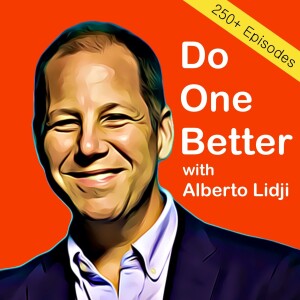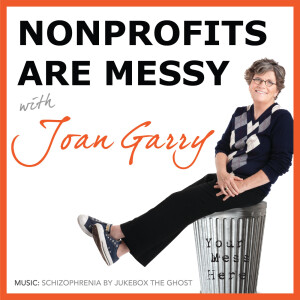
CEO of Aga Khan Foundation UK, Matt Reed, joins Alberto Lidji to talk about the Aga Khan Development Network, its $5.5bn of annual operations, relationships with 40,000 civil society organisations and much more.
The Aga Khan Foundation is one of 10 development agencies that together form the Aga Khan Development Network, founded by His Highness the Aga Khan. They work across all 17 UN Sustainable Development Goals (SDGs) and aim to:
- Improve the quality of life, in all its dimensions, in all the communities where they are active
- Promote pluralism
- Enhance self-reliance and civil society
They’re active in approximately 20 countries across central and south Asia, east and west Africa, and the Middle East. They focus on the poorest of the poor, in some of the most remote regions of the countries where they’re active.
Across the Network, they employ between 80,000 and 90,000 people – excluding the communities and volunteers they work with – and the Foundation itself works with approximately 40,000 civil society organisations annually. Annual operations across all 10 agencies is roughly $5.5bn.
When the Foundation started 50 years ago, the idea was to understand the communities where they were going to and to ask them what matters most to them in terms of development priorities (as opposed simply to taking a top down approach to solutions and strategies). Matt notes the importance they place on ensuring their development work is truly long-lasting – they believe that people themselves need to be the agents of change and that it is important to create local ownership.
They form representative groups at the local, village level, composed of men and women from all faiths and backgrounds; they facilitate conversations with them to help develop an understanding of what works, and what doesn’t, and to gain insight into local communities’ most pressing priorities.
Matt explains that his role in the UK is to represent not only the Foundation’s work but also the work of all 10 development agencies across their Network to European development partners and, to a lesser extent, to development partners in Asia and the Middle East – always in consultation with their people on the ground, in the field, who are doing work across their various countries of operations.
They have two universities: the first is the Aga Khan University, which was founded approximately 35 years ago and is primarily based in Pakistan, with some operations in Afghanistan; and with a network of campuses in east Africa – in Kenya, Tanzania and Uganda. Its initial focus was teacher training and nursing.
The second university is the University of Central Asia, which was established in 2000. It is a four-way, public-private partnership between the Aga Khan and the governments of Tajikistan, Kirgizstan and Kazakhstan. It was established within a post-Cold War context following the fall of the Soviet Union, and was designed to address the human capacity needs of central Asia and aims to create regional exchanges and a regional knowledge base.
Matt’s key takeaway: he wishes for listeners to keep in mind the long-term nature of the work being undertaken by the Aga Khan Development Network in improving the quality of life in all its dimensions and in promoting pluralism. They want to work, and do work, with everyone – and in today’s world this message is as important now as it has ever been.
Visit Lidji.org for guest bios, episode notes and useful links. Please subscribe and share if you enjoy this episode -- thank you!
More Episodes
Vicky Fox, CEO of the UK Supreme Court, provides a fascinating glimpse into the Court’s work in community outreach, education, diversity and accessibility
 2023-09-18
2023-09-18
World Food Programme’s Martin Frick on the global food crisis, climate change and empowering people to drive forward positive change
 2023-09-11
2023-09-11
Martin Allen Morales, CEO of the Institute of Imagination, on transforming our education system
 2023-09-04
2023-09-04
Bhawani Singh Shekhawat of the Akshaya Patra Foundation on tackling classroom hunger
 2023-08-28
2023-08-28
Rachel Sandby-Thomas on skills and social mobility
 2023-08-21
2023-08-21
Liesel Pritzker Simmons (Co-Founder) and Corina Gardner (CEO) of the IDP Foundation, on building a sustainable education ecosystem
 2023-08-14
2023-08-14
George Richards, Director of Community Jameel, on J-PAL and advancing science and learning for communities to thrive
 2023-08-07
2023-08-07
Katy Talikowska, CEO of the Valuable 500, on ending disability exclusion
 2023-07-31
2023-07-31
Mallory Dwinal-Palisch, Chancellor of Reach University, on their innovative apprenticeship route to becoming a teacher
 2023-07-24
2023-07-24
Paige Murphy, Head of the Wimbledon Foundation, on improving lives through sports and innovative partnerships
 2023-07-17
2023-07-17
Rupert Abbott, Executive Director of GiveOut, on LGBTI advocacy through a human rights lens
 2023-07-10
2023-07-10
Paul Ronalds, CEO of Save the Children Global Ventures, on impact investing and unlocking capital
 2023-07-03
2023-07-03
Krish Kandiah, Founder of the Sanctuary Foundation, on welcoming refugees with open arms
 2023-06-26
2023-06-26
Emma Cherniavsky, UK CEO of the UN Refugee Agency (UNHCR) on World Refugee Day and Changing the Narrative of how Refugees and Displaced Persons are Perceived
 2023-06-19
2023-06-19
Hilary Cottam, Professor at the Institute for Innovation and Public Purpose at UCL (University College London) and author of Radical Help, on social design and rethinking our vertical post-war systems
 2023-06-12
2023-06-12
Sophie Otiende, CEO of the Global Fund to End Modern Slavery, on creating a survivor-led environment
 2023-06-05
2023-06-05
Priya Naik, Founder & CEO of Samhita, on sustainable livelihoods in India
 2023-05-29
2023-05-29
Nitzan Pelman, CEO and Founder of Climb Hire, on the value of networks and leveraging social capital
 2023-05-22
2023-05-22
Gemma Mortensen, Founder and Co-Creator of New Constellations, on imagining and creating better, more beautiful futures
 2023-05-15
2023-05-15
International Rescue Committee’s (IRC) UK Executive Director, Laura Kyrke-Smith, on supporting refugees in the UK
 2023-05-08
2023-05-08
Create your
podcast in
minutes
- Full-featured podcast site
- Unlimited storage and bandwidth
- Comprehensive podcast stats
- Distribute to Apple Podcasts, Spotify, and more
- Make money with your podcast
It is Free
You may also like

The Business Of


Nonprofits Are Messy: Lessons in Leadership | Fundraising | Board Development | Communications


Nonprofit Mastermind Podcast


Exhausted Sparrows Unite


Nonprofit Lowdown


The Gender Justice Brief


- Privacy Policy
- Cookie Policy
- Terms of Use
- Consent Preferences
- Copyright © 2015-2024 Podbean.com


 iOS
iOS Android
Android